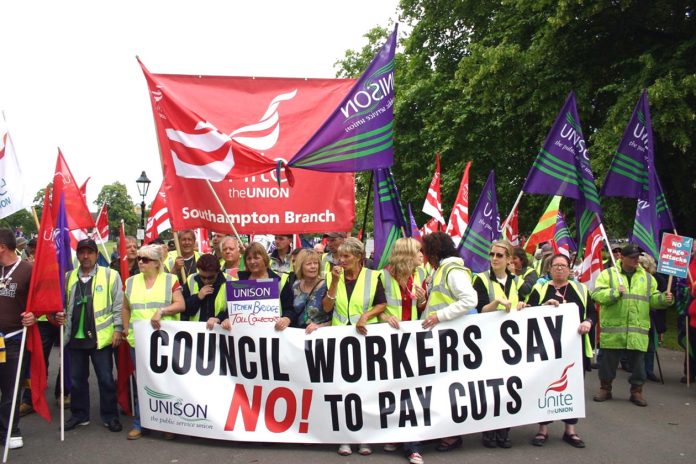
PUBLIC services staff in Southampton have rejected a revised pay proposal by the Tory city council and voted to continue their programme of rolling strikes.
Unison and Unite members voted by four to one to continue with industrial action, while negotiating for a better deal.
The long-running dispute has seen hundreds of council staff strike over the past 12 weeks – including social workers, waste and recycling workers, street cleaners, library staff and toll bridge collectors.
At the heart of the dispute is the council’s decision to sack and rehire all of its workforce, on lower pay, making a total of £6m in savings – £3m from wages and £3m from allowances.
The latest proposal was to return £1m into wages.
But Unison regional organiser Andy Straker said yesterday: ‘We have been negotiating around a deal where there are no cuts in pay.
‘We wanted them to put £3m back. So the proposal was nowhere near good enough.
‘It’s fair to say that the members were very angry last night, and frustrated. They’ve told the council exactly what they think. The trouble is that the council’s not listening.’
A joint union mass meeting on Thursday was attended by 600 of the 2,400 Unison and Unite members directly employed by the council.
In voting to continue industrial action, they accepted that after August 15, and 12 weeks of industrial action, strikers will lose their legal protection from dismissal.
Straker added: ‘The members have made the decision that they want to carry on.
‘We have an idea which sections we want to strike next, and will speak with those members in the near future, to explain what it means. Then we will announce further action.’
He said that the emphasis in the council’s proposal on returning the wages of qualified social workers to their former levels particularly angered members, including the social workers themselves.
He added: ‘It was the kind of move that could have turned worker against worker. But in fact it antagonised our members even more, with people getting the money being just as angry as those who weren’t.
‘The qualified social workers were really unhappy that the unqualified social workers and admin staff, who they regard as colleagues, were not being made the same offer.’